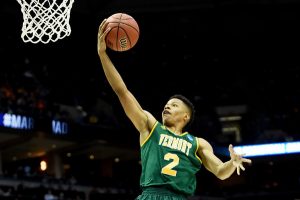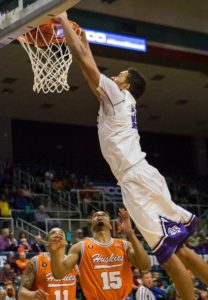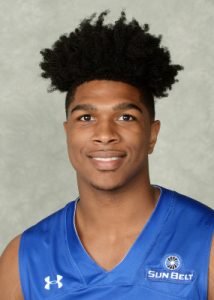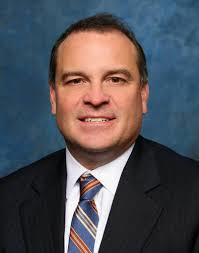CLICK HERE for all of Jon’s interviews, and the rest of our extensive and continuous preseason coverage
Some players come from privilege, some come from poverty…and some come from Serbia. Jasmina “Jazz” Perazic moved to America in the late 1970s to attend college at Maryland and proceeded to lead the Terps to 4 straight ACC tourney title games, wining 3 in a row from 1981-1983. She won a bronze medal for Yugoslavia at the 1980 Olympics, was named an ACC Tournament Legend in 2008, and was inducted into the Women’s Basketball Hall of Fame in 2014. She is currently the head coach at Georgian Court University, where she will try to get the Lions headed in the right direction this season. HoopsHD’s Jon Teitel got to chat with Jazz about facing Pat Summitt in the NCAA tourney and making the transition from player to coach.
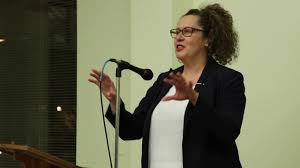
You were born in Serbia: how did you 1st get into basketball? I am so glad you asked me how I got into basketball because of all the publicity that the US soccer team is getting right now. I always wanted to be a soccer player and played in the streets all day long with the boys: that is what we do in Europe. We usually played street pick-up soccer games and when most of the kids went home at dusk we switched to basketball for a little 3-on-3. I practiced soccer/basketball by myself when the other children had to go home to eat lunch and dinner. 2 highly overrated activities I thought at that time, but of course now lunch and dinner are some of the most fun activities! 1 time I was on the field by myself dribbling the ball from 1 goal to the other, making moves and yelling out the names of the players that created these fancy moves. I was playing the role of at least 5 different players. I was 100% sure that I would play professional soccer and another 100% sure that I would be the best player ever. Some boys were just walking around with nothing better to do than make fun of girls and they yelled out to me, “You know girls do not play soccer!” I was 10 or 11 years old at the time. Perhaps because my dad never told me that I could not do something because I was a girl, it came as quite a shock. I thought about it and decided to make my mom find a place where I could play basketball because I heard that women played basketball on the professional level. My parents knew nothing about sports. I remember dragging my mom around the city of Novi Sad trying to find a place I could join to play basketball. In all honesty nobody was really helpful, but we finally found a place. The name of the club was KK Vojvodina and when my mom asked what she needed to do so I could start playing basketball they told her, “Nothing: just have your daughter come on such and such day and she will be in”, so I got into basketball by default.
You began your college career at Maryland in 1979: what made you choose the Terps, and how did you like playing for Hall of Fame coach Chris Weller? Choosing Maryland was another 1 of my well-thought-out plans. I went to American High School in Frankfurt, Germany where my coach was adamant that I was going to play basketball in college. I had no interest in going to school in America: everything was going perfectly right where I was. The only thing that interested me about America was the opportunity to visit Disneyland/Disney World and check out the White House. My coach sent some of my game footage to UCLA, Maryland, and Hawaii. The reasons were very simple: UCLA and Maryland had played in the championship game the previous season and there was a military connection with the coaches from Hawaii (Frankfurt High was a school for military dependents). The reason I chose Maryland was a genius decision: I did not feel like flying another 6 hours west to Los Angeles! I made my decision without knowledge of anything. I was definitely more clueless than the most clueless person in the universe but I guess I was lucky. I am 100% sure that I made the right decision: I cannot imagine any other situation turning out better. Coach Weller was amazing back then and is still amazing. She was a teacher, a mentor, and later became a great friend. She was 1 of the best teachers of the game ever. She had the ability/knowledge/patience to get more out of us than any other coach could have done: she was a genius when it came to bringing out the best in people. I had the most wonderful experience at Maryland. I can easily say that Coach Weller was greatly responsible for all my success both on and off the court and I will never be able to thank her enough. The closest thing to thanking her for everything that she did for me will probably be through coaching…but only if I coach like she did: with integrity. I must continue to teach and create great experiences for my players, honor the game that she gave so much to, and give my best efforts in further promoting and growing this beautiful game that she knew so well and loved so much. If I can do all that then I think it would make her happy.
At the 1980 Olympics you played for Yugoslavia: what did it mean to you to beat Hungary and win a bronze medal? It was an amazing feeling to go to the Olympics and win the bronze: it was all like a dream. We had such a great camaraderie on our team and a great relationship with our men’s team (who won a gold medal) that it made the whole experience even more special. On a personal level it was very gratifying to accomplish something as big as winning an Olympic medal after receiving bunch of stupid threats from the Yugoslavian/Serbian Basketball Federation that if I left to play in another country then I would never have a chance to play for our National Team. Giving me that ultimatum was the best thing they ever did for me. After hearing that I could not wait to leave the country and go prove myself elsewhere: that was about 10 months prior to receiving the invitation for the tryout. The best (and somewhat saddest) part of this whole thing is that I received this invitation thanks to another amazing player from Maryland and 1 of the 2 best point guards to ever play the game: Tara Heiss. Tara was the PG for the US team at the qualification tournament in Bulgaria. After her team beat our team she walked over to our coach (Milan Vasojevic) and told him in English (Tara was great but it would just make her too perfect if she learned Serbian!) that his best player was at Maryland. 9 months later I got a phone call and an invitation to try out for the Yugoslavian Olympic Team. How was I ready? I had the best coach who in 1 year turned me from a no-name talent into a player who will be remembered and recognized around the world. Due to President Jimmy Carter’s boycott Tara and the rest of team USA ended up not going to the Olympics: my medal belongs to her as well.
In the 1981 AIAW tourney you scored 14 PTS in a 1-PT win over Kentucky: how were you able to hang on for the win after almost blowing a 10-PT lead in the final 2 minutes? I really do not remember all of that. I am sure that many American players would relive these moments and remember them forever. However, I was still learning so much about the American system and what it means to be in a tournament. There was already talk of the NCAA vs. the AIAW. It was all sort of confusing for me: I only knew that I had a tremendous passion for the game and great love for my teammates. I wanted to help my American teammates achieve something special. I remember us being an amazingly cohesive unit. I remember playing with some amazing players like Debbie Lytle, Marcia Richardson, and Boe Pearman. I also remember doing some really stupid things in quite a few games (including the 1 against Kentucky) so I think the reason we had to hold on to the win was probably because of something interesting I did!
You then lost to Tennessee for the 2nd straight year in the postseason: what was it like to face Coach Pat Summitt in the tourney? Coach Summitt was an amazing coach/person: she is an icon and a legend. What I remember most about Coach Summitt is her fairness, her respect for the game, and her loyalty to her players. I had the privilege of talking with her on many occasions, especially during my travels with my National Team. As a matter of fact, she was coaching the US team during their tour of Yugoslavia and I acted as their little private translator. I would translate, then I would score 30 PTS, then translate, then score another 30 PTS: it was fun! The Tennessee teams were really tough. I remember how neither Tennessee nor Old Dominion were good matchups for us at that time: they just had too much height. We were all kind of guards playing all the positions: even though I was a guard I think I was also the tallest person on our team. It was fun playing against Tennessee: they always played great defense. They were the better team so we never lost the game to them: they won it.
In the 1982 NCAA tourney Lorri Bauman scored a tourney-record 50 PTS (21-35 FG) in a loss by Drake: was it just 1 of those scenarios where ever shot she put up seemed to go in because she was “in the zone”? I knew she had a lot of points but I did not think it was 50. Coach Weller had this theory that teams with 1 player who scored more points than the rest of her teammates could not beat us. 1 player cannot beat an entire team, especially not a cohesive team like we were…but Lorri came kind of close I guess. I knew that we were going to win that game. 1 of our ACC opponents was Clemson who had an amazing scorer named Barbara Kennedy. I believe she scored 40 PTS against us almost every time we played them, but I am pretty sure that Clemson never beat us so this was Coach Weller’s plan. We were to stop a few other players, let Lorri go off, and we would win the game…and that is what happened.
After losing the 1980 ACC tourney title game at College Park, you won 3 straight ACC tourneys on the road from 1981-1983: what is the key to winning games in the postseason? The key is making sure that you are playing your best basketball when it matters the most. Make sure you are in your best shape and that you are playing great team defense…and then hope for no major injuries.
In 1983 you were named All-American: what did it mean to you to win such an outstanding honor? None of the accolades I received during my playing career felt that special. Part of it was because some of the awards happened here in the States and at that time I knew very little about the whole system here. I felt so far away from everything/everybody back home who would even care that I did not really pay attention to it. I think it would be totally different today because the world is such a small place. Video captures everything and it can be seen anywhere in the world immediately. I also never played to win awards: I played for the love of the game and always cared much more about my teammates. Most of the players who achieve high honors could never achieve them without their teammates and I had some really special ones. Being named All-American did feel great though. It was very rewarding to be selected along with players who I knew from international competition. Most of the players named to the All-America team were members of the US National Team: they were all really special and wonderful people.
After graduating you played professionally overseas for several years: what is the biggest difference between college basketball in the US and pro basketball overseas? It is really difficult to compare US and international basketball. I do believe that the main difference between the 2 is the interpretation of what it means to play team basketball. International players/coaches believe that Americans play selfish basketball and a lot of 1-on-1. They think that just because you share the ball on offense you are a “team”. In the US a team atmosphere comes from playing defense. When a player goes 1-on-1 on the offensive end he/she is really creating a 2-on-2 situation because as soon as you attack you will draw the attention of another player that automatically makes it 2-on-2, and then depending on the next action possibly 3-on-3. I always had a great appreciation for the American game: I always felt more at ease and had more fun playing here. I loved playing with and against American players. I enjoyed playing overseas but mostly playing with my National Team because of the level of competition. Most of the basketball on the club level lacks the intensity and excitement of basketball in the US. The closest we get to the real level is in big international tournaments like the Olympics, World Championships, World University Games, Pan American Games, or European Championships. That applies to both the men’s and women’s game.
In 2014 you were inducted into the Women’s Basketball Hall of Fame: where does that rank among the highlights of your career? Being inducted was definitely a highlight. It was truly an amazing event and it felt great to be remembered/recognized. It feels great to have your name live on forever. It feels wonderful to be rewarded not just for a few great moments but for an entire body of work: my life’s work of basketball. To have my daughter Deanna Gipe present at the ceremony made it over-the-top special.
You currently work as head coach of the women’s team at Georgian Court University: why did you take the job, and what do you hope to do in the future? I will try not to be too sentimental about this or get philosophical (maybe even spiritual) about my decision to take the job and AD Laura Liesman’s decision to offer me the job. All I can tell you is that this is the perfect place for me: I love it here. I love what this school stands for and everything about this school. I was looking for a place where I could do more than just coach basketball and that place found me. This school is special for so many reasons. It was founded by the Sisters of Mercy and has been educating young women since 1908. After a long history as a women’s college, Georgian Court University became fully coeducational in 2013. The foundation of Georgian Court was created on 5 beautiful core values of Respect, Integrity, Justice, Compassion, and Service. I could go on and on about our school even though I have only been here a little while. I could already write a novel about this school! I guarantee you that people will hear about Georgian Court University. I will do everything in my power to represent this beautiful place in the best light possible and our players will do the same. As far as basketball is concerned I love the challenge. Greatness is possible everywhere and is only a short while away. Success with integrity is achievable: you will see it at Georgian Court University!

